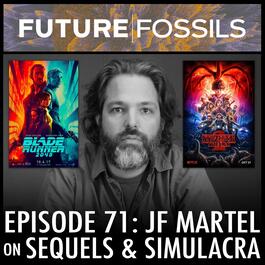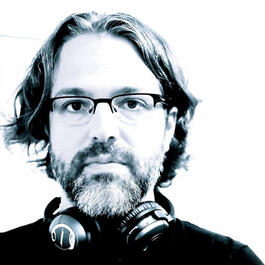
71 - JF Martel (On Sequels & Simulacra, Blade Runner 2049 & Stranger Things 2)
Subscribe on Apple Podcasts • Stitcher • Spotify • iHeart Radio Join our Facebook Discussion Group This week’s episode features returning guest JF Martel, film-maker, culture critic, and author of Reclaiming Art in the Age of Artifice. In his first appearance on Future Fossils, we discussed art as an opening to the transcendent and his awesome three-part essay on the philosophy of Netflix’s Stranger Things, “Reality Is Analog”…so it only made sense to have him back to weigh in on Stranger Things 2 and the extremely artful Blade Runner 2049, both of which speak directly to the evolution of the soul and “the human tragedy” in an increasingly digital age. It’s ultimately a discussion of The Sequel, and how what distinguishes good simulacra from bad is all in the label, “Made With Love”… JF’s book and blog: http://reclaimingart.com JF’s podcast: http://weirdstudies.com We Discuss: - The humanization of replicants (and the “animalization” of a previously monstrous demogorgon) as empathetic characters in these stories, and how that provides a vital contrast to our future-shocked insistence on hard categorical divisions between made and born, human and non-human; - Carl Jung and Jungian therapist James Hillman, The Velveteen Rabbit, and “earning one’s soul” through individuation of the self (soul as connection to the imaginal contrasted with soul as individuality); - Where does order come from in the evolutionary process?; - The theological angle on the soul as digital because it is the soul as the absolute appearance of a singular (non-evolutionary) form; - Do things need to happen for a reason?; - Is it better to act as if you’ll die tomorrow or to act as if you’ll live forever? (And does thinking “only now exists” make you a lousier person?); - Balancing the two poles of “soul” in philosophy: that which exists beyond cause and effect, and that which is made through tribulation; - Looking at our lives from the perspective of Nietzsche’s Eternal Return and Alan Watts’ notion of the life as a symphony, comprehensible only from the outside; - The genius horror writing of Thomas Lugatti (sp?); - Why it’s so important not to spoon-feed your audience the plot points of a film, to invite them into an interactive process with the narrative; - Donna Haraway, John David Ebert, body hacking…and the shadow form of posthuman philosophy in the peril of ironic hipster detachment to human incarnation; - Rachel Nagelberg’s book The Fifth Wall and how she figures our postmodern dissociation from self through a matrix of surveillance technologies and the out-of-body experiences they induce (see also Erik Davis and Technobuddhism); - The difference between a good sequel and a bad one is “Made With Love” – and how the character of “Luv” in Blade Runner 2049 can be read as a statement on the evils irony is capable of; - The Strong Female Lead as a major trope in recent cinema, from Silence of the Lambs to The X Files to Arrival, and what it means about femininity and institutions in our current Zeitgeist; - An update on the writing process of Michael’s book, How To Live in the Future; - More gushing about James P. Carse’s book, Finite and Infinite Games; - Dungeons & Dragons. ;) - And more! Quotes: “There’s no reason why something can’t happen for no reason at all. The only way you can prove the Principle of Sufficient Reason - that things happen for a reason - is by presupposing the principle.” “The universe might have come about in all its complexity ten seconds ago, and might disappear in another ten seconds for no reason at all.” “We don’t know what death means, so we don’t know what it means to live your last day, in that context. But the idea to live as if you’re already dead – that to me has a lot of resonance, because it means that you live your life in such a way that the story of your life has been written somewhere. For me it resembles Nietzsche’s idea of The Eternal Return: it’s that every action you take should be something you would will yourself doing for the rest of time, for eternity, so that everything resonates at the deepest level.” “Good stories don’t really work in such a way that everything has its place, morally, in the universe. It’s more like everything makes sense at the aesthetic level. It’s like everything fits together aesthetically somehow, through some weird synchronicity. And I think that it’s possible to look at life that way, and to experience life that way.” “I would compare Jurassic World to one of those Old West roadshows that used to travel around in the 1910s and recreate the battles of the Wild West in the kitschiest, most facile way possible – and Stranger Things is more like a Pre-Raphaelite painting to me. It’s SO hyper-aware of what it’s doing, and at the same time it’s not ironic. It REALLY IS nostalgic. It REALLY IS pining for that lost time.” “I don’t think technology is helping a lot of people ‘make a soul.’” Get bonus content on Patreon Support this show http://supporter.acast.com/futurefossils. Hosted on Acast. See acast.com/privacy for more information. This is a public episode. If you'd like to discuss this with other subscribers or get access to bonus episodes, visit michaelgarfield.substack.com/subscribe
From "Humans On The Loop"




Comments
Add comment Feedback